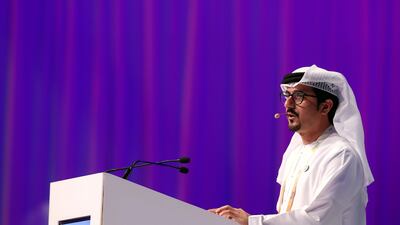Mubadala Investment Company, Abu Dhabi’s strategic investment arm, said investments in green and blue hydrogen production will address some of the "inherited issues" of renewables, as Opec's third-largest producer forges ahead with its clean energy programme.
The company identified green and blue hydrogen as among the most promising areas for investment in renewable energy that the UAE is well-positioned to capitalise on, Musabbeh Al Kaabi, chief executive of UAE investments at Mubadala, said at the Global Energy Forum in Dubai on Monday.
Hydrogen comes in various forms, including blue, green and grey. Blue and grey hydrogen are produced from natural gas, while green is derived from renewable sources.
"I think we are very strongly positioned to capitalise on blue hydrogen. When it comes to the green, we can produce the lowest-cost solar energy and that means a lot when it comes to hydrogen production," he said.
"These are very, very exciting trends coming up and I think hydrogen will address some of the inherited issues of renewables. We just need a few more years, hopefully."
Last year, Adnoc and Taqa said they would join Mubadala to become shareholders in Masdar, in a move that will help to increase the clean energy company's renewable power capacity to more than 50 gigawatts by 2030. The deal will support the UAE’s role in the energy transition, help to create a "global champion in renewables and green hydrogen" and accelerate progress towards the country’s strategic goal of achieving carbon neutrality.
The trend towards hydrogen in renewable investment is "the real thing", Mr Al Kaabi said when asked if there was too much hype around it.
"There is an infrastructure already we can capitalise on within natural gas infrastructure globally, so there's a benefit from capitalising on existing infrastructure and pivoting towards lower carbon," he said.
Reflecting on the Russia-Ukraine conflict's effect on energy markets and the world economy, Mr Al Kaabi said: "We share concerns about what's happening and the escalation in Eastern Europe that's creating new dynamics globally.
"It's creating interesting dynamics related to the potential for excessive inflation that could lead to a European recession that could drive the world economy downwards," he said.
In the medium-to-long term it could also affect the energy transition agenda, he said, referring to industrial gases produced in Europe.
"We need to carefully look at our supply chain when it comes to the technology, when it comes to the energy transition and identify these bottlenecks," he said. "Any future disruption in the system might have even worse consequences on the ability for the world economy to pivot towards a smoother energy transition."
Asked about the effect of the conflict on energy prices, he said that on one hand the crisis "exposed the [gaps in the] energy transition" and shows that traditional energy sources will have a "significant role" to play as the world shifts towards renewables going forward. On the other hand, future geopolitical tension would also disrupt the energy transition supply chains and that will be a "very interesting dynamic" to see developing.
Reflecting on the region, he said it would maintain its role as a reliable supplier of traditional and renewable energy.
Mubadala Petroleum's deal last year with Israel’s Delek Drilling to buy a 22 per cent stake in the Eastern Mediterranean's offshore Tamar field reflects "new dynamics" after the UAE signed the Abraham Accords with Israel, he said.
While this was "unthinkable" a decade ago, he said it hopefully indicates more collaboration in the region.


